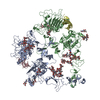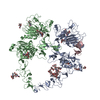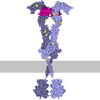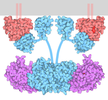[English] 日本語
 Yorodumi
Yorodumi- PDB-8u4l: Structure of the HER2/HER4/NRG1b Heterodimer Extracellular Domain -
+ Open data
Open data
- Basic information
Basic information
| Entry | Database: PDB / ID: 8u4l | ||||||||||||
|---|---|---|---|---|---|---|---|---|---|---|---|---|---|
| Title | Structure of the HER2/HER4/NRG1b Heterodimer Extracellular Domain | ||||||||||||
 Components Components |
| ||||||||||||
 Keywords Keywords | MEMBRANE PROTEIN / TRANSFERASE / Receptor Tyrosine Kinase | ||||||||||||
| Function / homology |  Function and homology information Function and homology informationERBB3 signaling pathway / positive regulation of peptidyl-tyrosine autophosphorylation / establishment of planar polarity involved in nephron morphogenesis / ERBB4 signaling pathway / ERBB4-ERBB4 signaling pathway / olfactory bulb interneuron differentiation / central nervous system morphogenesis / activation of transmembrane receptor protein tyrosine kinase activity / ventricular cardiac muscle cell differentiation / positive regulation of striated muscle cell differentiation ...ERBB3 signaling pathway / positive regulation of peptidyl-tyrosine autophosphorylation / establishment of planar polarity involved in nephron morphogenesis / ERBB4 signaling pathway / ERBB4-ERBB4 signaling pathway / olfactory bulb interneuron differentiation / central nervous system morphogenesis / activation of transmembrane receptor protein tyrosine kinase activity / ventricular cardiac muscle cell differentiation / positive regulation of striated muscle cell differentiation / neuregulin receptor activity / cardiac muscle tissue regeneration / negative regulation of secretion / endocardial cell differentiation / negative regulation of neuron migration / negative regulation of immature T cell proliferation in thymus / ERBB3:ERBB2 complex / ERBB2-ERBB4 signaling pathway / GRB7 events in ERBB2 signaling / RNA polymerase I core binding / immature T cell proliferation in thymus / neural crest cell development / mitochondrial fragmentation involved in apoptotic process / cardiac muscle cell myoblast differentiation / cell communication / semaphorin receptor complex / mammary gland epithelial cell differentiation / PI3K events in ERBB4 signaling / peripheral nervous system development / embryonic pattern specification / transmembrane receptor protein tyrosine kinase activator activity / cardiac muscle cell differentiation / chemorepellent activity / ventricular trabecula myocardium morphogenesis / GABA receptor binding / ErbB-3 class receptor binding / mammary gland development / positive regulation of protein localization to cell surface / motor neuron axon guidance / Sema4D induced cell migration and growth-cone collapse / regulation of microtubule-based process / activation of protein kinase B activity / epidermal growth factor receptor binding / neural crest cell migration / epidermal growth factor receptor activity / ERBB signaling pathway / negative regulation of cardiac muscle cell apoptotic process / positive regulation of tyrosine phosphorylation of STAT protein / PLCG1 events in ERBB2 signaling / ERBB2-EGFR signaling pathway / enzyme-linked receptor protein signaling pathway / ERBB2 Activates PTK6 Signaling / regulation of postsynaptic neurotransmitter receptor internalization / neurotransmitter receptor localization to postsynaptic specialization membrane / ERBB2-ERBB3 signaling pathway / Drug-mediated inhibition of ERBB2 signaling / Resistance of ERBB2 KD mutants to trastuzumab / Resistance of ERBB2 KD mutants to sapitinib / Resistance of ERBB2 KD mutants to tesevatinib / Resistance of ERBB2 KD mutants to neratinib / Resistance of ERBB2 KD mutants to osimertinib / Resistance of ERBB2 KD mutants to afatinib / Resistance of ERBB2 KD mutants to AEE788 / Resistance of ERBB2 KD mutants to lapatinib / Drug resistance in ERBB2 TMD/JMD mutants / neuromuscular junction development / positive regulation of Rho protein signal transduction / positive regulation of MAP kinase activity / positive regulation of transcription by RNA polymerase I / ERBB2 Regulates Cell Motility / nickel cation binding / semaphorin-plexin signaling pathway / oligodendrocyte differentiation / protein tyrosine kinase activator activity / Signaling by ERBB4 / PI3K events in ERBB2 signaling / Long-term potentiation / mammary gland alveolus development / cell fate commitment / SHC1 events in ERBB4 signaling / regulation of angiogenesis / cell surface receptor signaling pathway via JAK-STAT / negative regulation of extrinsic apoptotic signaling pathway in absence of ligand / positive regulation of protein targeting to membrane / Nuclear signaling by ERBB4 / Schwann cell development / regulation of ERK1 and ERK2 cascade / positive regulation of cardiac muscle cell proliferation / coreceptor activity / lactation / synapse assembly / Signaling by ERBB2 / TFAP2 (AP-2) family regulates transcription of growth factors and their receptors / myelination / transmembrane receptor protein tyrosine kinase activity / positive regulation of cell adhesion / GRB2 events in ERBB2 signaling / SHC1 events in ERBB2 signaling / Downregulation of ERBB4 signaling / regulation of cell migration Similarity search - Function | ||||||||||||
| Biological species |  Homo sapiens (human) Homo sapiens (human) | ||||||||||||
| Method | ELECTRON MICROSCOPY / single particle reconstruction / cryo EM / Resolution: 3.31 Å | ||||||||||||
 Authors Authors | Trenker, R. / Diwanji, D. / Bingham, T. / Verba, K.A. / Jura, N. | ||||||||||||
| Funding support |  Germany, Germany,  United States, 3items United States, 3items
| ||||||||||||
 Citation Citation |  Journal: Elife / Year: 2024 Journal: Elife / Year: 2024Title: Structural dynamics of the active HER4 and HER2/HER4 complexes is finely tuned by different growth factors and glycosylation. Authors: Raphael Trenker / Devan Diwanji / Tanner Bingham / Kliment A Verba / Natalia Jura /  Abstract: Human Epidermal growth factor Receptor 4 (HER4 or ERBB4) carries out essential functions in the development and maintenance of the cardiovascular and nervous systems. HER4 activation is regulated by ...Human Epidermal growth factor Receptor 4 (HER4 or ERBB4) carries out essential functions in the development and maintenance of the cardiovascular and nervous systems. HER4 activation is regulated by a diverse group of extracellular ligands including the neuregulin (NRG) family and betacellulin (BTC), which promote HER4 homodimerization or heterodimerization with other HER receptors. Important cardiovascular functions of HER4 are exerted via heterodimerization with its close homolog and orphan receptor, HER2. To date structural insights into ligand-mediated HER4 activation have been limited to crystallographic studies of HER4 ectodomain homodimers in complex with NRG1β. Here, we report cryo-EM structures of near full-length HER2/HER4 heterodimers and full-length HER4 homodimers bound to NRG1β and BTC. We show that the structures of the heterodimers bound to either ligand are nearly identical and that in both cases the HER2/HER4 heterodimer interface is less dynamic than those observed in structures of HER2/EGFR and HER2/HER3 heterodimers. In contrast, structures of full-length HER4 homodimers bound to NRG1β and BTC display more large-scale dynamics mirroring states previously reported for EGFR homodimers. Our structures also reveal the presence of multiple glycan modifications within HER4 ectodomains, modeled for the first time in HER receptors, that distinctively contribute to the stabilization of HER4 homodimer interfaces over those of HER2/HER4 heterodimers. | ||||||||||||
| History |
|
- Structure visualization
Structure visualization
| Structure viewer | Molecule:  Molmil Molmil Jmol/JSmol Jmol/JSmol |
|---|
- Downloads & links
Downloads & links
- Download
Download
| PDBx/mmCIF format |  8u4l.cif.gz 8u4l.cif.gz | 455.8 KB | Display |  PDBx/mmCIF format PDBx/mmCIF format |
|---|---|---|---|---|
| PDB format |  pdb8u4l.ent.gz pdb8u4l.ent.gz | 384.5 KB | Display |  PDB format PDB format |
| PDBx/mmJSON format |  8u4l.json.gz 8u4l.json.gz | Tree view |  PDBx/mmJSON format PDBx/mmJSON format | |
| Others |  Other downloads Other downloads |
-Validation report
| Arichive directory |  https://data.pdbj.org/pub/pdb/validation_reports/u4/8u4l https://data.pdbj.org/pub/pdb/validation_reports/u4/8u4l ftp://data.pdbj.org/pub/pdb/validation_reports/u4/8u4l ftp://data.pdbj.org/pub/pdb/validation_reports/u4/8u4l | HTTPS FTP |
|---|
-Related structure data
| Related structure data |  41886MC  8u4iC  8u4jC  8u4kC M: map data used to model this data C: citing same article ( |
|---|---|
| Similar structure data | Similarity search - Function & homology  F&H Search F&H Search |
- Links
Links
- Assembly
Assembly
| Deposited unit | 
|
|---|---|
| 1 |
|
- Components
Components
-Protein , 3 types, 3 molecules ABC
| #1: Protein | Mass: 67909.648 Da / Num. of mol.: 1 Source method: isolated from a genetically manipulated source Source: (gene. exp.)  Homo sapiens (human) / Gene: ERBB4, HER4 / Cell line (production host): EXPI293F / Production host: Homo sapiens (human) / Gene: ERBB4, HER4 / Cell line (production host): EXPI293F / Production host:  Homo sapiens (human) Homo sapiens (human)References: UniProt: Q15303, receptor protein-tyrosine kinase |
|---|---|
| #2: Protein | Mass: 66888.008 Da / Num. of mol.: 1 Source method: isolated from a genetically manipulated source Source: (gene. exp.)  Homo sapiens (human) / Gene: ERBB2, HER2, MLN19, NEU, NGL / Cell line (production host): EXPI293F / Production host: Homo sapiens (human) / Gene: ERBB2, HER2, MLN19, NEU, NGL / Cell line (production host): EXPI293F / Production host:  Homo sapiens (human) Homo sapiens (human)References: UniProt: P04626, receptor protein-tyrosine kinase |
| #3: Protein | Mass: 5890.792 Da / Num. of mol.: 1 / Fragment: EGF-like domain (UNP residues 177-236) Source method: isolated from a genetically manipulated source Source: (gene. exp.)  Homo sapiens (human) / Gene: NRG1, GGF, HGL, HRGA, NDF, SMDF / Plasmid: pET32 / Production host: Homo sapiens (human) / Gene: NRG1, GGF, HGL, HRGA, NDF, SMDF / Plasmid: pET32 / Production host:  |
-Sugars , 6 types, 13 molecules 
| #4: Polysaccharide | alpha-D-mannopyranose-(1-3)-beta-D-mannopyranose-(1-4)-2-acetamido-2-deoxy-beta-D-glucopyranose-(1- ...alpha-D-mannopyranose-(1-3)-beta-D-mannopyranose-(1-4)-2-acetamido-2-deoxy-beta-D-glucopyranose-(1-4)-2-acetamido-2-deoxy-beta-D-glucopyranose Source method: isolated from a genetically manipulated source | ||||||
|---|---|---|---|---|---|---|---|
| #5: Polysaccharide | alpha-D-mannopyranose-(1-3)-[alpha-D-mannopyranose-(1-6)]beta-D-mannopyranose-(1-4)-2-acetamido-2- ...alpha-D-mannopyranose-(1-3)-[alpha-D-mannopyranose-(1-6)]beta-D-mannopyranose-(1-4)-2-acetamido-2-deoxy-beta-D-glucopyranose-(1-4)-2-acetamido-2-deoxy-beta-D-glucopyranose Source method: isolated from a genetically manipulated source | ||||||
| #6: Polysaccharide | beta-D-mannopyranose-(1-4)-2-acetamido-2-deoxy-beta-D-glucopyranose-(1-4)-2-acetamido-2-deoxy-beta- ...beta-D-mannopyranose-(1-4)-2-acetamido-2-deoxy-beta-D-glucopyranose-(1-4)-2-acetamido-2-deoxy-beta-D-glucopyranose Source method: isolated from a genetically manipulated source #7: Polysaccharide | alpha-D-mannopyranose-(1-6)-beta-D-mannopyranose-(1-4)-2-acetamido-2-deoxy-beta-D-glucopyranose-(1- ...alpha-D-mannopyranose-(1-6)-beta-D-mannopyranose-(1-4)-2-acetamido-2-deoxy-beta-D-glucopyranose-(1-4)-2-acetamido-2-deoxy-beta-D-glucopyranose | Source method: isolated from a genetically manipulated source #8: Polysaccharide | Source method: isolated from a genetically manipulated source #9: Sugar | |
-Details
| Has ligand of interest | N |
|---|---|
| Has protein modification | Y |
-Experimental details
-Experiment
| Experiment | Method: ELECTRON MICROSCOPY |
|---|---|
| EM experiment | Aggregation state: PARTICLE / 3D reconstruction method: single particle reconstruction |
- Sample preparation
Sample preparation
| Component | Name: Ternary complex of HER2/HER4/NRG1b / Type: COMPLEX / Entity ID: #1-#3 / Source: MULTIPLE SOURCES | ||||||||||||||||||||
|---|---|---|---|---|---|---|---|---|---|---|---|---|---|---|---|---|---|---|---|---|---|
| Molecular weight | Experimental value: NO | ||||||||||||||||||||
| Source (natural) | Organism:  Homo sapiens (human) Homo sapiens (human) | ||||||||||||||||||||
| Source (recombinant) | Organism:  Homo sapiens (human) Homo sapiens (human) | ||||||||||||||||||||
| Buffer solution | pH: 7.4 | ||||||||||||||||||||
| Buffer component |
| ||||||||||||||||||||
| Specimen | Embedding applied: NO / Shadowing applied: NO / Staining applied: NO / Vitrification applied: YES | ||||||||||||||||||||
| Specimen support | Grid type: Quantifoil R1.2/1.3 | ||||||||||||||||||||
| Vitrification | Instrument: FEI VITROBOT MARK IV / Cryogen name: ETHANE / Humidity: 100 % / Chamber temperature: 293 K |
- Electron microscopy imaging
Electron microscopy imaging
| Experimental equipment |  Model: Titan Krios / Image courtesy: FEI Company |
|---|---|
| Microscopy | Model: TFS KRIOS |
| Electron gun | Electron source:  FIELD EMISSION GUN / Accelerating voltage: 300 kV / Illumination mode: FLOOD BEAM FIELD EMISSION GUN / Accelerating voltage: 300 kV / Illumination mode: FLOOD BEAM |
| Electron lens | Mode: BRIGHT FIELD / Nominal defocus max: 2000 nm / Nominal defocus min: 900 nm |
| Image recording | Electron dose: 45.8 e/Å2 / Film or detector model: GATAN K3 (6k x 4k) / Num. of grids imaged: 1 |
- Processing
Processing
| EM software |
| ||||||||||||||||||||||||
|---|---|---|---|---|---|---|---|---|---|---|---|---|---|---|---|---|---|---|---|---|---|---|---|---|---|
| CTF correction | Type: PHASE FLIPPING AND AMPLITUDE CORRECTION | ||||||||||||||||||||||||
| 3D reconstruction | Resolution: 3.31 Å / Resolution method: FSC 0.143 CUT-OFF / Num. of particles: 289192 / Symmetry type: POINT |
 Movie
Movie Controller
Controller





 PDBj
PDBj
















